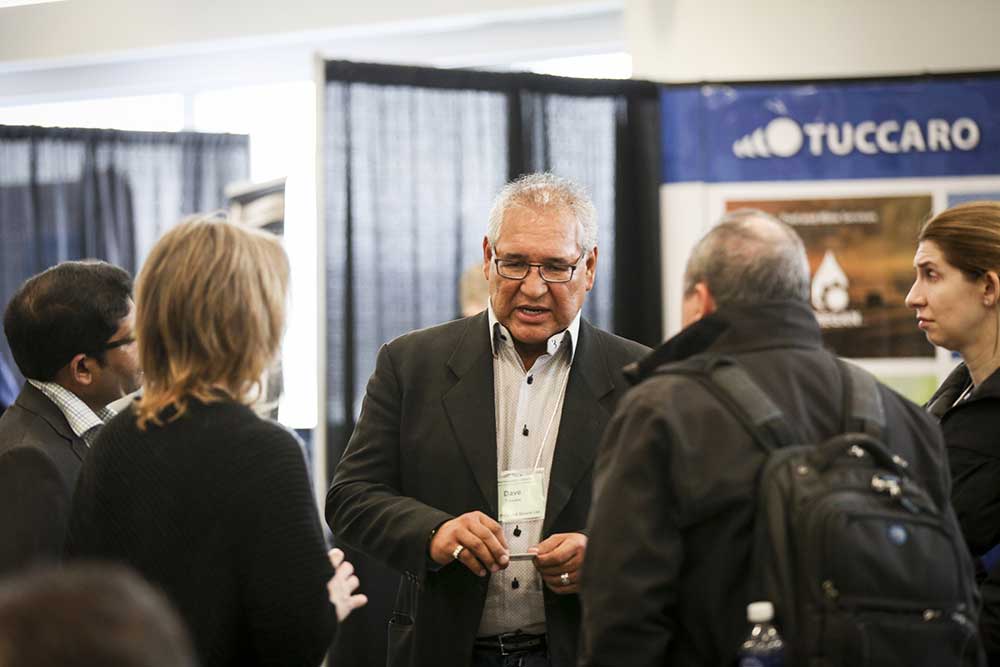Leading Alberta’s oil sands industry
By Rajitha Sivakumaran
 For many companies in Fort McMurray, it is hard not to talk about the wildfire that happened in May. Dave Tuccaro, President and CEO of the Tuccaro Group, called it “a kick in the teeth”. His group of seven companies have operated in the region catering to oil sands companies for decades. Through one or more of its companies, the Tuccaro Group has worked on every oil sands site in the region, and clients include Syncrude Canada, Suncor, Shell and more. Despite successfully serving major oil sands companies in Alberta with its highly diversified service line, even the Tuccaro Group felt the wrath of the fire.
For many companies in Fort McMurray, it is hard not to talk about the wildfire that happened in May. Dave Tuccaro, President and CEO of the Tuccaro Group, called it “a kick in the teeth”. His group of seven companies have operated in the region catering to oil sands companies for decades. Through one or more of its companies, the Tuccaro Group has worked on every oil sands site in the region, and clients include Syncrude Canada, Suncor, Shell and more. Despite successfully serving major oil sands companies in Alberta with its highly diversified service line, even the Tuccaro Group felt the wrath of the fire.
The event changed things. Employees lost their homes and were displaced all over the country, but Craig Jenkins, the Tuccaro Group’s COO, says, “We didn’t come here, we’re from here, we didn’t show up to cash in and cash out. We’re not going anywhere.”
In fact, all of Dave Tuccaro’s businesses have been in high-gear despite natural disasters and falling oil prices. So what has been fueling the Tuccaro Group’s success? The answer lies with innovation, the sheer determination to succeed, and its people.
“By the nature of the pressure the resource industry has been under in recent years, we had no choice but to find innovative ways to reduce cost, promote value and redefine the way we operate,” Jenkins said. “This has led to a better, stronger culture that has allowed us to improve our service.”
Behind every leader, there are people, and both Tuccaro and Jenkins attribute the company’s success to its employees. “I’m very proud of our employees. We all know that if the companies succeed, we all do,” Jenkins said.
Dave Tuccaro, Serial Entrepreneur
Immediately after completing high school in the 1970s, Tuccaro moved to Fort McMurray and joined the oil sands industry. Since then his resume has grown exponentially; he has dabbled in taxi services, janitorial services, a bakery and real estate. He even worked as the band manager for his own First Nations group, the Mikisew Cree First Nation in Fort Chipewyan.
Eventually, he arrived at a managerial position at Neegan Development Corporation in Fort McMurray, which was then owned by four First Nations groups and specialized in heavy equipment and construction. In the 1990s, Tuccaro purchased Neegan. Since then, he has founded a series of successful service companies.
In 2007-2008, Jenkins oversaw the Group’s construction of an $8 million infrastructure project. The new facility was developed to house two companies: Neegan Technical Services (laboratory and geotechnical services) and Water Pure & Simple (bottled water supplier). The group of companies now includes Tuc’s Contracting (a trucking business), Re-stock (supply management) and TPS (a property development and management company).
“It’s in our entrepreneurial DNA to innovate,” Jenkins said, and there is no doubt that Tuccaro is the initiator.
His entrepreneurial roots go back to when he was seven or eight years old. His principal, he says, started a marble program that taught him about ROI at a very young age. The program worked like this: students purchased marbles (one penny per marble) from the principal at the beginning of each week, engaged in games and then sold their marbles back to her on Friday. Tuccaro would buy 50 marbles on Monday and by Friday, he would have collected 500. “From $0.50 to $5 in a week, that’s pretty good return on investment,” he said with a laugh.
He learned a few things from that program. Practice paid off and it wasn’t long before he became a veteran marble player. “The benefit was that I would win marbles from other kids. I think entrepreneurs get that feeling early on no matter where you’re from,” he said, adding that being from an isolated community in Northern Alberta didn’t hinder his success as a businessman.
Spearheading the Aboriginal Business Movement
“If you take a look at the history of Aboriginal business in Canada, it has only been the last 20 or 30 years where we are just starting to get involved in the Canadian economy,” Tuccaro said. The consequence of this when he first began his startups was a lack of willing lenders to supply capital. The relatively recent boom in Native business also meant that entrepreneurs like Tuccaro had neither reference nor counsel in the beginning. Instead he was one of the people leading this movement.
“In order for us in the oil sands to take advantage of contract opportunities, we needed the oil companies to step up and support us,” Tuccaro said. He singles out Syncrude Canada Ltd. as a leader for involving the Aboriginal community through direct employment and contract opportunities to supply goods and services. His praise goes especially to two Syncrude employees, Eric Newell and Jim Carter, for stepping outside the box at a time when it was not popular for corporate Canada to help Aboriginal communities.
The years have brought with them remarkable business acumen, growth and success for the First Nations community. “Aboriginal groups are moving forward and saying: we don’t just want jobs anymore, we don’t just want contract opportunities anymore, we want to own parts of the business as well,” said Tuccaro.
He is currently working with Calvin Helin of Spirit Eagle Energy on a pipeline from Fort McMurray to the Prince Rupert area in the West Coast. Fifty-one per cent of the ownership will belong to the First Nations groups that will be impacted along the route, he says. He encourages all companies operating on reserve territory to work with First Nations communities and view them as a true partner.
Companies like the Tuccaro Group are here to stay and shape Aboriginal business for years to come. “Fort McMurray is a strong community and we’re a strong group. No one here is afraid of hard work, that will see us through to the end,” Jenkins said.






